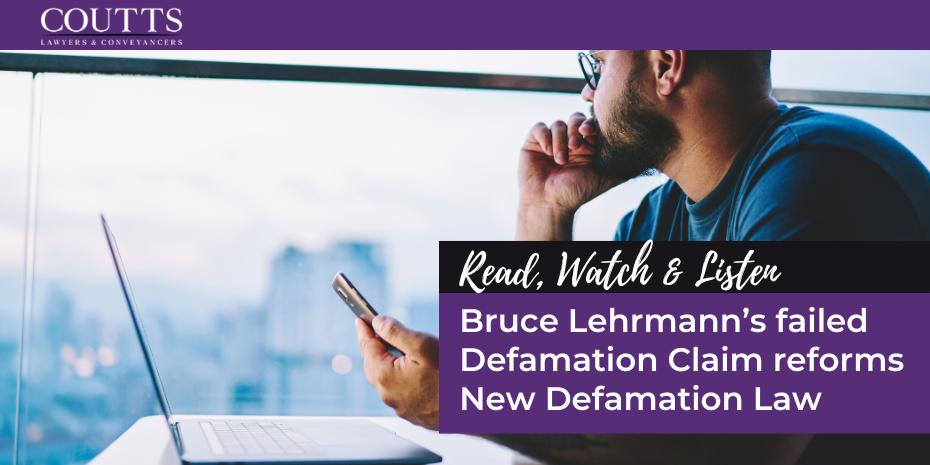KEY TAKE OUTS:
- Bruce Lehrmann commenced defamation proceedings in February 2023 against Network Ten and Lisa Wilkinson for their interview relating to the alleged rape of Brittany Higgins.
- Lehrmann was unsuccessful in his defamation claim and Justice Lee upheld that Network Ten and Wilkinson had substantiated the substantial truth defence. Justice Lee also made findings in the civil case that Lehrmann was guilty of the sexual assault allegations despite the criminal trial not proceeding.
- Lehrmann has recently lodged a notice of appeal with the Full Federal Court of Appeal in respect to Justice Lee’s finding in the defamation claim and the order that he pay Network Ten’s legal costs on an indemnity basis.
- Assessing prospects of success prior to commencing or defending any claim in Court for defamation is crucial as there could be significant financial consequences.
- There have been several reforms regarding Defamation claims, with further reforms relating to digital matters to come into effect from 1 July 2024.
The Lehrmann Defamation Case
On 15 February 2021, young political staffer Brittany Higgins appeared in an interview with journalist Lisa Wilkinson on Network Ten program The Project and made allegations that she had been raped by a colleague inside a Parliament House office two years prior. The colleague was not named in the interview; however, the interview invited people to speculate about the identity of the person being accused and 6 months later in August 2021, it came to light that Higgins had been referring to her colleague Bruce Lehrmann.
Lehrmann was charged over the allegations but his criminal trial for sexual assault ended in October 2022 when the jury was dismissed and a mistrial declared due to juror misconduct. The matter was relisted for trial in February 2023; however, the proceedings were discontinued due to concerns for Higgins’ welfare. Lehrmann has always adamantly denied the allegations and has not been found guilty of the charges.
Lehrmann subsequently commenced defamation proceedings in February 2023 against Network Ten and Lisa Wilkinson for the interview.
Whilst Lehrmann was not referred to by name in the interview, he claims he was identifiable. Whilst it would be expected that the statements in the interview would likely influence viewers, and could affect the perpetrator’s reputation, Network Ten relied on the substantial truth and qualified privilege defences.
To defend publication of material that could be considered defamatory, Network Ten made submissions that publication was justified on the basis that the imputation that Lehrmann raped Higgins was substantially true and therefore they were providing accurate and reasonable journalism and acted reasonably in broadcasting the interview, which was in the public interest. With respect to the truth defence, Network Ten had to satisfy the civil proof standard of on the balance of probabilities, a lower threshold than what would have been required to be met in the criminal trial being, beyond a reasonable doubt.
Despite not being found guilty in the criminal case, as a result of Lehrmann commencing the defamation proceedings, the civil Judge was required to assess whether the comments made by Network Ten were justified and accordingly in doing so, he had to reach a conclusion regarding Higgins claim. The civil Judge determined that “Higgins has been proven to be a victim of sexual assault” and accordingly, he found that Lehrmann was guilty of the allegations against him in respect to the civil defamation claim. Justice Lee was not satisfied that “Lehrmann turned his mind to consent” nor at the relevant time had “a state of mind of actual cognitive awareness that Ms Higgins did not consent”.
Justice Lee upheld the substantial truth defence but found that the qualified privilege defence had failed and determined that it was “More likely than not [that Mr Lehrmann was] so intent upon gratification to be indifferent to Ms Higgins’s consent and hence went ahead with sexual intercourse without caring whether she consented”. The end result being that Lehrmann lost his defamation claim against Network Ten and Wilkinson.
Lehrmann has recently appealed Justice Lee’s decision on the grounds that the judge breached procedural fairness in allowing a case to be found that was not pleaded or advanced by the first and second respondent or in the evidence of the primary witnesses. The appeal also states that the interview suggests a violent rape had occurred, which is contrary to the nonviolent rape involving inadvertent recklessness as to consent which was ultimately found in Justice Lee’s judgment.
The appeal matter will come before the Federal Court later this year, with three Federal Court judges to reside over the hearing in a full court appeal. Lehrmann has currently confirmed that he will run the appeal as a self-represented litigant.
What now?
Lehrmann on appeal will now have to prove to the Federal Full Court of Appeal that Justice Lee’s decision was wrong and that he made an error of fact or law in dismissing his defamation claim.
Following Justice Lee’s judgement, the Federal Court also ordered Lehrmann to pay 95% of Network Ten’s legal costs incurred in defending the defamation claim brought against the Network and Wilkinson on an indemnity basis, being a greater sum than is usually awarded in costs orders as it was determined that Lehrmann brought the case on a “knowingly false premise”. At this stage Network Ten’s legal costs are estimated to be in the vicinity of $5 million. Should Lehrmann be unsuccessful on appeal, the cost order made against him will be payable together with the costs incurred on appeal. However, Network Ten is unlikely to recover a substantial part of the costs as Lehrmann is unlikely to be in a financial position to pay such a large amount and even if Network Ten commences enforcement action against Lehrmann to obtain payment, this is likely to force him into bankruptcy.
Reforms to Defamation Laws
In order to balance unjust harm being caused to a person’s reputation whilst ensuring that the principle of free expression is not unduly restricted, particularly in matters of public interest, amendments to the defamation laws in NSW were proposed as a two-stage process with the first stage commencing on and from 1 July 2021.
The first stage introduced:
- a ‘serious harm’ threshold for defamation claims whereby a plaintiff must establish that a defamatory publication causes, or is likely to cause, serious harm to their reputation. Similarly, corporate plaintiffs entitled to sue for defamation must now establish ‘serious financial loss’ to their business; and
- A further defence to defamation claims where the defendant can show that the published material concerned an issue of public interest and they reasonably believed that publication was in the public interest.
Stage 2 reforms will be implemented in 1 July 2024 and aim at catching “digital matters”, adjusting the liability of social media platforms, and other digital intermediaries who administer online platforms. The reforms create an exemption from liability for passive digital intermediaries, meaning a platform will no longer be liable for the publishing of defamatory information provided that the platform did not actively contribute to the production of defamatory material in the matter. However, if they did contribute, they will remain liable. There will also be a new defence available for digital intermediaries if they have a complaints process in place and take steps within 7 days of receiving that complaint. The new reforms will also provide the Court with power to control defamatory material reposted by intermediaries that are not parties to proceedings.
How Coutts can Help
If you are concerned about material that has been published about you or have been accused of publishing defamatory material, let Coutts be your guide in protecting your rights and reputation. Assessing prospects of success prior to commencing or defending any claim in Court for defamation is crucial as there could be significant financial consequences.
Court proceedings for defamation claims must be commenced within 12 months from the date of publication; however, this timeframe may be extended to 3 years if the Court is satisfied that the original timeframe was not reasonable in the circumstances. You should urgently contact Coutts for advice if the 12-month time limit is about to expire or has already expired.
For further information please don’t hesitate to contact:
info@couttslegal.com.au
1300 268 887
This blog is merely general and non specific information on the subject matter and is not and should not be considered or relied on as legal advice. Coutts is not responsible for any cost, expense, loss or liability whatsoever in relation to this blog, including all or any reliance on this blog or use or application of this blog by you.



